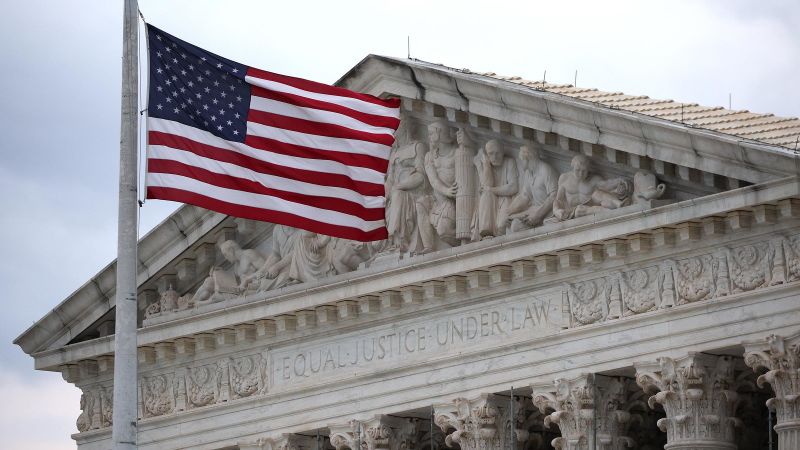- Get link
- X
- Other Apps
- Get link
- X
- Other Apps

Supreme Court Greenlights Trump's Suspension of Deportation Protections for Immigrants from Cuba, Haiti, Nicaragua, and Venezuela
In a significant ruling on Friday, the Supreme Court allowed the Trump administration to proceed with its plan to suspend a Biden-era humanitarian parole program. This program had provided temporary legal status, allowing approximately half a million immigrants from Cuba, Haiti, Nicaragua, and Venezuela to live and work in the United States.
This marks the second instance this month where the high court has sided with Trump's efforts to revoke temporary legal status for immigrants. Previously, the Supreme Court cleared the way for the administration to end another temporary program granting work permits to hundreds of thousands of Venezuelans.
The court's brief order, typical of its emergency docket, was unsigned and offered no specific reasoning. Justices Sonia Sotomayor and Ketanji Brown Jackson, both liberal members of the court, dissented from the decision.
Impact of the Ruling:
- The ruling enables the administration to expedite deportations for an estimated 530,000 migrants who previously benefited from the program.
- The exact number of beneficiaries who may have applied for alternative forms of protection or immigration relief remains unknown.
"I cannot overstate how devastating this is," stated Karen Tumlin, founder and director of Justice Action Center, a member of the legal team representing the migrants. She emphasized the widespread chaos this decision could unleash on the migrants, their families, workplaces, and communities.
Dissenting Voices:
Justice Jackson, in a strongly worded dissent joined by Sotomayor, argued that the court had "plainly botched" the formula for deciding whether to lift a lower court ruling. She highlighted the devastating consequences of abruptly upending the lives and livelihoods of nearly half a million noncitizens while their legal claims are still pending.
Jackson wrote, "The court has now apparently determined that the equity balance weighs in the government’s favor, and, I suppose, that it is in the public’s interest to have the lives of half a million migrants unravel all around us before the courts decide their legal claims."
Administration's Perspective:
Stephen Miller, former White House deputy chief of staff, hailed the Supreme Court's decision, stating that the migrants "can now be deported because the Supreme Court justly stepped in and stopped these crazy lower court injunctions."
Broader Implications:
According to Steve Vladeck, CNN Supreme Court analyst and a professor at Georgetown University Law Center, this ruling dramatically increases the number of migrants from the four countries subject to removal. He also suggests it raises the stakes of another pending emergency case from the Trump administration, where they are seeking the power to remove migrants to countries other than their homeland without a meaningful opportunity to contest their removal.
Background on Humanitarian Parole:
- Federal immigration law has allowed administrations to "parole" certain migrants arriving at the border for humanitarian reasons since the 1950s.
- Paroled migrants are typically allowed to live and work in the country legally for two years, although their status is temporary.
- The Biden administration established the program in 2023 for qualified migrants from Cuba, Haiti, Nicaragua, and Venezuela who submitted to review by authorities instead of entering the country illegally. Applicants needed an American sponsor and had to pass security vetting.
The central legal question is whether the Department of Homeland Security can revoke parole status for all migrants immediately, or if it must conduct individual case-by-case reviews.
The Trump administration argued that terminating parole status was one of its "most consequential immigration policy decisions," and that lower court orders blocking the policy disrupted critical immigration strategies designed to deter illegal entry.
Judge Indira Talwani initially blocked the administration's efforts, stating that while individual parole could be ended after review, a wholesale termination was not permissible.
This case is one of many emergency appeals concerning immigration that have reached the Supreme Court since Trump took office, highlighting the ongoing legal battles surrounding immigration policy and the judiciary's role in shaping its direction. The immediate future for hundreds of thousands of individuals now hangs in the balance, pending further legal challenges and potential shifts in policy.
Tags: Trump, Immigration, Supreme Court, Humanitarian Parole, Cuba, Haiti, Nicaragua, Venezuela, Biden, Legal Status
Source: https://edition.cnn.com/2025/05/30/politics/supreme-court-trump-deportations-parole
Biden
Cuba
Haiti
Humanitarian Parole
Immigration
Legal Status
Nicaragua
Supreme Court
Trump
Venezuela
- Get link
- X
- Other Apps
Comments
Post a Comment